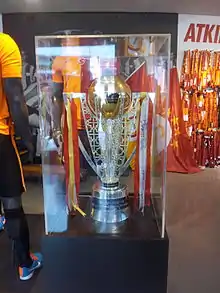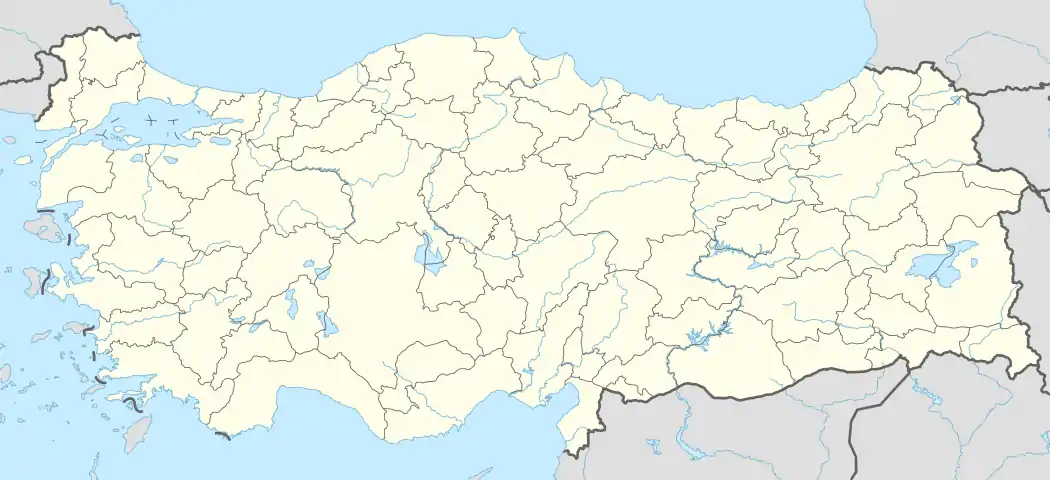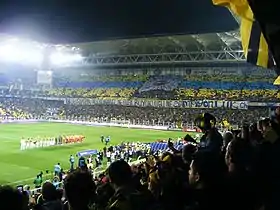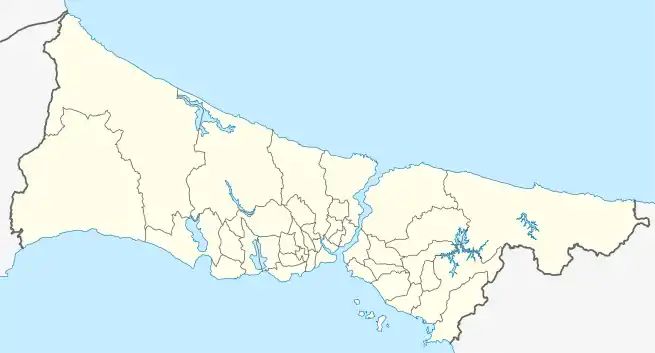Süper Lig
The Süper Lig (Turkish pronunciation: [ˈsypæɾ liɟ], Super League) is a Turkish professional league for association football clubs. It is the top-flight of the Turkish football league system and is run by the Turkish Football Federation. Eighteen clubs compete annually, where a champion is decided and three clubs are promoted and relegated from, and to, the 1. Lig. The season runs from August to May, with each club playing 34 matches. Matches are played Friday through Monday.
 | |
| Organising body | Turkish Football Federation (TFF) |
|---|---|
| Founded | 1959; 61 years ago |
| Country | Turkey |
| Confederation | UEFA |
| Number of teams | 21 |
| Level on pyramid | 1 |
| Relegation to | TFF First League |
| Domestic cup(s) | Turkish Cup Turkish Super Cup |
| International cup(s) | UEFA Champions League UEFA Europa League UEFA Europa Conference League |
| Current champions | İstanbul Başakşehir (1st title) (2019–20) |
| Most championships | Galatasaray (22 titles) |
| Most appearances | Oğuz Çetin (503)[1] |
| Top goalscorer | Hakan Şükür (249)[2] |
| TV partners | List of broadcasters |
| Website | tff.org |
| Current: 2020–21 Süper Lig | |
The competition was initially established as the Millî Lig (National League) in 1959 - the first professional nationwide league competition held in Turkey.[3] The league succeeded the Turkish Football Championship and the National Division, both being former top-level national competitions. The Süper Lig is currently 11th in the UEFA coefficient ranking of leagues based on club performances in European competitions over the last five years.[4] A total of 73 clubs have competed in the Süper Lig, but only six have won the title to date: Galatasaray (22), Fenerbahçe (19), Beşiktaş (15), Trabzonspor (6), Bursaspor (1) and İstanbul Başakşehir (1).
History
Football in Turkey stems back to the late 19th century, when Englishmen brought the game with them while living in Salonica (then part of the Ottoman Empire).[5] The first league competition was the Istanbul Football League, which took place in the 1904–05 season. The league went through several variations until the creation of the Millî Lig (Süper Lig) in 1959. Between the creation of the Istanbul League and Millî Lig, several other regional leagues took place: Adana (1924), Ankara (1922), Eskişehir (1924), İzmir (1924), Bursa (1924), and Trabzon (1922), to name a few. The first competition to bring forth a national champion was the former Turkish Football Championship, which began in 1924 and continued until 1951.[6] The championship format was based on a knockout competition, contested between the winners of each of the country's top regional leagues.[7] The National Division (Turkish: Millî Küme) was the first national league competition in Turkey. Started in 1937, the National Division consisted of the strongest clubs from the Ankara, Istanbul, and İzmir leagues. The championship lasted until 1950.[8][9]
The Federation Cup was established in 1956 to decide a national champion. This champion would go on to participate in the European Cup. The competition was held for two seasons until it was replaced by the Millî Lig. Beşiktaş won both editions and qualified for the European Cup during the two-year span. However, since the TFF failed to register their name for the draw in time, Beşiktaş could not participate in the 1957–58 season after all.[10][11]
The top clubs of Ankara, Istanbul, and İzmir competed in the 1959 Turkish National League. The first season took place in the calendar year of 1959, instead of 1958-59, since the qualifying stages took place in 1958. The 16 clubs who competed in the first season were: Adalet (Istanbul), Altay (İzmir), Ankaragücü (Ankara), Ankara Demirspor (Ankara), Beşiktaş (Istanbul), Beykoz (Istanbul), Karagümrük (Istanbul), Fenerbahçe (Istanbul), Galatasaray (Istanbul), Gençlerbirliği (Ankara), Göztepe (İzmir), Hacettepe Gençlik (Ankara), İstanbulspor, İzmirspor, Karşıyaka (İzmir), and Vefa (Istanbul). The first champions were Fenerbahçe and the first "Gol Kralı" (top scorer) was Metin Oktay. No clubs were promoted or relegated at the end of the first season.[12]
The 2. Lig (Second League) was created at the start of the 1963–64 season and the Millî Lig became known as the 1.Lig (First League). Before the foundation of a second division, the bottom three clubs competed with regional league winners in a competition called the Baraj Games. The top three teams of the group were promoted to the Süper Lig. After the foundation of a new second division in 2001, known as the 1. Lig, the formerly titled 1. Lig was rebranded as Süper Lig.[13] The Süper Lig is home of the Fenerbahçe–Galatasaray derby, the most watched football game in Turkey. It is considered to be one of the best and most intense in the world, being ranked among the greatest football rivalries of all-time by various international sources.[14][15][16]
Competition format

There are 18 clubs in the Süper Lig. During the course of the season (from August to May) each club plays the others twice (a double round robin system), once at their home stadium and once at that of their opponents, for a total of 34 games. Teams receive three points for a win and one point for a draw. No points are awarded for a loss. Teams are ranked by total points, then head-to-head record, then goal difference, and then goals scored. At the end of each season, the club with the most points is crowned champion. If points are equal, the head-to-head record and then goal difference determine the winner. The three lowest placed teams are relegated to the 1. Lig and the top two teams from the 1. Lig, together with the winner of play-offs involving the third to sixth placed 1. Lig clubs are promoted in their place.[17]
Qualification for European competitions
Qualification for European competitions is as follows: champions qualify for the group stage of the Champions League, runners-up qualify for the second qualifying round of the Champions League, third place qualifies for the third qualifying round of the Europa League, and fourth place qualifies for the second qualifying round of the same competition. A fifth spot is given to the winner of the Turkish Cup, who qualify for the play-off round of the Europa League. If the Turkish Cup winner has already qualified for European competition through their league finish, the next highest placed club in the league takes their place.
UEFA ranking
As of 14 December 2018
| Ranking | Member association | Coefficient | |||||||
|---|---|---|---|---|---|---|---|---|---|
| 2019 | 2018 | Mvmt | 2014–15 | 2015–16 | 2016–17 | 2017–18 | 2018-19 | Total | |
| 9 | 8 | 10.000 | 9.800 | 5.500 | 8.000 | 4.800 | 38.100 | ||
| 10 | 10 | 6.000 | 6.600 | 9.700 | 6.800 | 4.900 | 34.000 | ||
| 11 | 12 | 6.083 | 5.750 | 9.100 | 2.900 | 6.800 | 30.633 | ||
Teams
 Istanbul Location of teams in 2019–20 Süper Lig
|
Istanbul Süper Lig football clubs
|
| Club | Province | Position in 2019-20 | First season in top division |
Seasons in top division |
First season of current spell |
Top division titles |
Last title |
|---|---|---|---|---|---|---|---|
| Alanyaspor | Antalya | 5th | 2016–17 | 5 | 2016–17 | — | |
| Ankaragücüa | Ankara | 18th | 1959 | 52 | 2018–19 | — | |
| Antalyaspor | Antalya | 9th | 1982–83 | 25 | 2015–16 | — | |
| Beşiktaşab | Istanbul | 3rd | 1959 | 63 | 1959 | 15 | 2016–17 |
| Çaykur Rizespor | Rize | 15th | 1979–80 | 20 | 2018–19 | — | |
| Denizlispor | Denizli | 14th | 1983–84 | 21 | 2019–20 | — | |
| BB Erzurumspor | Erzurum | 2nd (First League) | 2018-19 | 2 | 2020-21 | — | |
| Fatih Karagümrüka | Istanbul | 5th (First League) | 1959 | 6 | 2020-21 | — | |
| Fenerbahçeab | Istanbul | 7th | 1959 | 63 | 1959 | 19 | 2013–14 |
| Galatasarayab | Istanbul | 6th | 1959 | 63 | 1959 | 22 | 2018–19 |
| Gaziantepb | Gaziantep | 8th | 2019–20 | 2 | 2019–20 | — | |
| Gençlerbirliğia | Ankara | 12th | 1959 | 48 | 2019–20 | — | |
| Göztepea | Izmir | 11th | 1959 | 29 | 2017–18 | — | |
| Hatayspor | Hatay | 1st (First League) | 2020-21 | 1 | 2020-21 | — | |
| Başakşehir | Istanbul | 1st | 2007–08 | 13 | 2019-20 | 1 | 2019-20 |
| Kasımpaşa | Istanbul | 10th | 1959–60 | 17 | 2012–13 | — | |
| Kayserispor | Kayseri | 17th | 2004–05 | 21 | 2015–16 | — | |
| Konyaspor | Konya | 13th | 1988–89 | 20 | 2013–14 | — | |
| Sivasspor | Sivas | 4th | 2005–06 | 15 | 2017–18 | — | |
| Trabzonsporb | Trabzon | 2nd | 1974–75 | 47 | 1974–75 | 6 | 1983-84 |
| Yeni Malatyaspor | Malatya | 16th | 2017–18 | 4 | 2017–18 | — | |
a Founding member of the Süper Lig
b Never been relegated from the Süper Lig
Champions
In total, 15 clubs have won the Turkish championship title, including titles won before the Süper Lig's inception, namely in the former Turkish Football Championship and Turkish National Division,[3] which are denied and not counted by the Turkish Football Federation, even though they were official championships by the TFF itself.
Only six clubs have been champions since the beginning of the Süper Lig era in 1959: Galatasaray 22 times, Fenerbahçe 19 times, Beşiktaş 15 times (see note below), Trabzonspor 6 times, Bursaspor and İstanbul Başakşehir once.
| Club | Champions[18] | Runners-up | Winning years | Runners-up years |
|---|---|---|---|---|
| Galatasaray |
22 | 12 | 1962, 1963, 1969, 1971, 1972, 1973, 1987, 1988, 1993, 1994, 1997, 1998, 1999, 2000, 2002, 2006, 2008, 2012, 2013, 2015, 2018, 2019 | 19571, 19581, 1959, 1961, 1966, 1975, 1979, 1986, 1991, 2001, 2003, 2014 |
| Fenerbahçe |
19 | 22 | 1959, 1961, 1964, 1965, 1968, 1970, 1974, 1975, 1978, 1983, 1985, 1989, 1996, 2001, 2004, 2005, 2007, 2011, 2014 | 1960, 1962, 1967, 1971, 1973, 1976, 1977, 1980, 1984, 1990, 1992, 1994, 1998, 2002, 2006, 2008, 2010, 2012, 2013, 2015, 2016, 2018 |
| Beşiktaş |
15 | 14 | 19571, 19581, 1960, 1966, 1967, 1982, 1986, 1990, 1991, 1992, 1995, 2003, 2009, 2016, 2017 | 1963, 1964, 1965, 1968, 1974, 1985, 1987, 1988, 1989, 1993, 1997, 1999, 2000, 2007 |
| Trabzonspor | 6 | 9 | 1976, 1977, 1979, 1980, 1981, 1984 | 1978, 1982, 1983, 1995, 1996, 2004, 2005, 2011, 2020 |
| İstanbul Başakşehir | 1 | 2 | 2020 | 2017, 2019 |
| Bursaspor | 1 | — | 2010 | |
| Eskişehirspor | — | 3 | 1969, 1970, 1972 | |
| Adanaspor | — | 1 | 1981 | |
| Sivasspor | — | 1 | 2009 | |
1 Beşiktaş formally requested that championships won in the 1956–57 and 1957–58 editions of the Turkish Federation Cup be counted as Turkish Professional First Division championships to the Turkish Football Federation. The Cup was established in 1956 to find a national champion to represent Turkey, after UEFA decided that only national champions could participate in the European Cup.[3] Beşiktaş had therefore earned the right to represent Turkey in the European Cup in the 1957–58 and 1958–59 seasons.[19] The ruling on this matter was announced in a press release on March 25, 2002 which indicated that the championships won by Beşiktaş in the Federation Cup would be counted as national league championships.
Star rating system
The honor of Golden Stars was introduced in football to recognize sides that have won multiple championships or other honours by the display of gold stars on their team badges and jerseys. In Turkey, clubs are permitted to place a golden star above their crest for every five national championships won. For the 2018–19 season Galatasaray are permitted four golden stars, Fenerbahçe and Beşiktaş are permitted three golden stars, and Trabzonspor are permitted one golden star to be placed above their crest on their jerseys.
League participation
As of 2020, 73 clubs have participated. Note: The tallies below include up to the 2020-21 season. Teams denoted in bold are current participants.
Player records
Most goals
As of 27 July 2020
|
Most appearances
As of 27 July 2020
|
- Bold denotes players still active in the league.
- All players are Turkish unless otherwise indicated.
Turkish football clubs in UEFA competitions
| European Cup / UEFA Champions League | UEFA Cup / Europa League | UEFA Cup Winners' Cup | UEFA Super Cup | UEFA Intertoto Cup | ||||
|---|---|---|---|---|---|---|---|---|
| Club | Semi-finalist | Quarter-finalist | Winner | Semi-finalist | Quarter-finalist | Quarter-finalist | Winner | Winner |
| Galatasaray | 1989 | 1963, 1970, 1994‡, 2001, 2013 | 2000 | - | - | 1992 | 2000 | - |
| Fenerbahçe | - | 2008 | - | 2013 | - | 1964 | - | - |
| Beşiktaş | - | 1987 | - | - | 2003, 2017 | - | - | - |
| Bursaspor | - | - | - | - | - | 1975 | - | - |
| Göztepe | - | - | - | - | - | 1970 | - | - |
| Kayserispor | - | - | - | - | - | - | - | 2006 |
‡ Galatasaray was one of the final eight teams of the 1993–94 UEFA Champions League group stage, however, UEFA does not consider this a quarter-final participation.
See also
References and notes
- "Mackolik.com - iddaa, canlı sonuçlar, iddaa sonuçları, puan durumu, iddaa programı". Mackolik.com. Retrieved 11 November 2015.
- "Hakan Şükür". Mackolik.com. Retrieved 11 November 2015.
- "Turkey – List of Champions". rsssf.com. Rec.Sport.Soccer Statistics Foundation. 23 May 2019. Archived from the original on 25 May 2019. Retrieved 25 May 2019.
- Kassies, Bert. "UEFA Country Ranking 2018". kassiesa.home.xs4all.nl.
- "Before the national Turkish Leagues". turkish-soccer.com. Erdinç Sivritepe. Retrieved 27 May 2018.
- "Türkiye Futbol Federasyonu Kuruluyor". tff.org (in Turkish). Turkish Football Federation. Retrieved 26 October 2017.
1936'ya kadar süren bu dönemde ilk Türkiye Şampiyonası Ankara'da yapılmış ve şampiyon Harbiye olmuştur.
- "Türkiye Futbol Birinciliği". Erdinç Sivritepe. Retrieved 26 October 2017.
- "Türkiye Futbol Federasyonu Kuruluyor". tff.org (in Turkish). Turkish Football Federation. Retrieved 26 October 2017.
...ilk deplasmanlı lig kapsamındaki Milli Küme maçları da yine bu dönemde tertip edilmiştir.
- "Milli Küme". Erdinç Sivritepe. Retrieved 26 October 2017.
- Sivritepe, Erdinç Federation Cup 56/57 turkish-soccer.com, accessed 22 July 2010
- Sivritepe, Erdinç Federation Cup 57/58 turkish-soccer.com, accessed 22 July 2010
- Sivritepe, Erdinç 1959 Milli Lig turkish-soccer.com, accessed 22 July 2010
- Sivritepe, Erdinç 1963-1964 1. Lig turkish-soccer.com, accessed 22 July 2010
- "FourFourTwo's 50 Biggest Derbies in the World, No.6: Fenerbahce vs Galatasaray". fourfourtwo.com. FourFourTwo. Retrieved 11 May 2020.
- "The 50 greatest derbies in football throughout the world". givemesport.com. Retrieved 11 May 2020.
- "History of the Istanbul Derby - Fenerbahce vs Galatasaray". sportskeeda.com. Retrieved 11 May 2020.
- Official TFF competition rules Archived 2010-03-31 at the Wayback Machine
- "Süper Lig Şampiyonu Takımlar". www.tff.org (in Turkish). Turkish Football Federation. Retrieved 15 February 2018.
- "Türkiye Futbol Federasyonu Ana Sayfa TFF". www.tff.org.
- Dissolved in 2011 - Zonguldakspor Archived 2011-07-28 at the Wayback Machine
- played as İstanbul Büyükşehir Belediyespor before 2014-15 season - İstanbul Büyükşehir Belediyespor
- Football branch dissolved in 2011.
- Dissolved in 2013
- Now Turanspor
- Now Keçiörengüçü
- Became Van İl Özel İdarespor in 2004 and later closed in 2014
- Now Aydınspor 1923
- Dissolved in 2011
- Alibeyköyspor since 1971
- Dissolved in 2010 (TFF)
- (Dissolved in 2014) Siirtspor
- "Türkiye Spor Toto Süper Lig". mackolik.com. Retrieved 11 November 2015.
External links
 Media related to Süper Lig at Wikimedia Commons
Media related to Süper Lig at Wikimedia Commons- Süper Lig official website (in Turkish)
- Turkish Football Federation website (in Turkish)
- Turkey Süper Lig - Hailoosport.com

